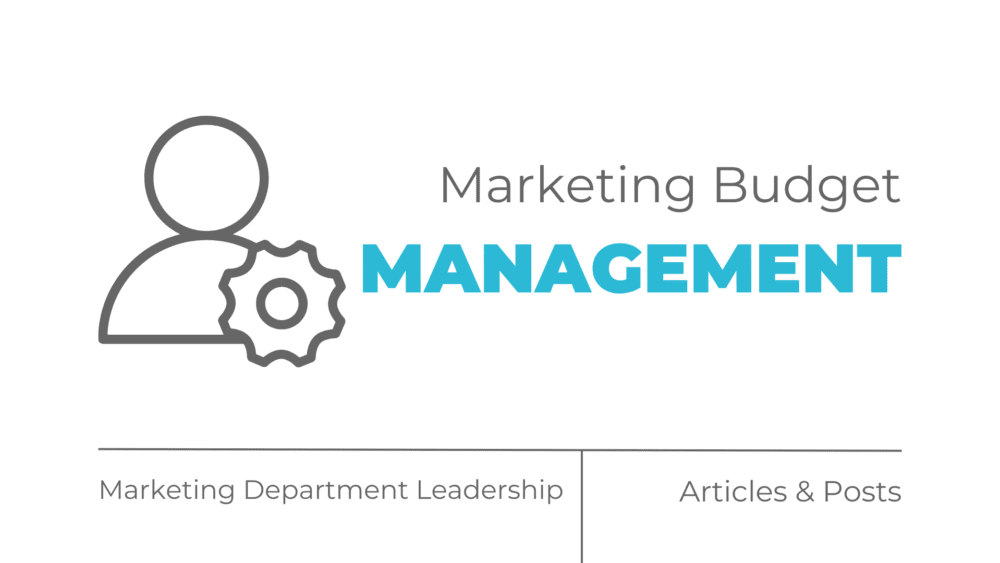If I had a dollar for every time an idea got shot down in the meeting because “We don’t have the budget”, I would finally have the money to execute that idea. -Unknown
All joking aside, managing a marketing department budget is a serious matter, and often stressful.
We don’t want to you to lose sleep over it.
With numerous factors to consider and decisions to make, it’s natural to have questions and concerns about how to properly allocate resources and drive maximum impact.
In this guide, we’ll answer your questions, provide valuable insights, and equip you with the knowledge and tools necessary to craft a robust marketing budget that aligns with your business goals and sets the foundation for success.
So, let’s dive in and explore the world of marketing budgeting together.
What does it mean to manage the marketing budget?
Managing a marketing budget means deciding how much money to spend on different marketing activities and making sure it helps the business grow.
This includes planning how to use the money, keeping an eye on how well the marketing is working, and making changes when needed to get the best results.
First, you need a plan that says what you want to achieve with your marketing, who you want to reach, and how you’ll measure success.
This helps you figure out where to spend your money, like on ads, social media, or other ways to promote your business.
It’s important to keep track of how well your marketing is working and if you’re spending your money wisely.
By watching the results and making changes when needed, you can make sure your marketing budget is helping your business succeed.
What should be included in a marketing budget?
A marketing budget should include:
- Money for ads: like online, print, or billboards.
- Social media: for creating and sharing content.
- Website costs: like hosting, design, and updates.
- Content creation: for blogs, videos, or graphics.
- Events: like trade shows or customer meetups.
- Public relations: for press releases or media outreach.
- Tools and software: to help with marketing tasks.
- Research: to learn about your customers and market.
- Promotions: like discounts, coupons, or giveaways.
- Staff costs: for salaries or freelancers.
Include all the things you need to promote your business and track how well they work.
This will help you spend your money wisely and get the best results.
What factors are to be considered while preparing marketing budget?
When preparing a marketing budget, consider these factors:
- Business goals: What you want to achieve with your marketing.
- Past results: How well previous marketing efforts worked.
- Market research: What your customers and competitors are doing.
- Marketing channels: Which ways of promoting work best for you.
- Costs: How much different marketing activities cost.
- Timeframe: How long your marketing plan will run.
- Sales targets: How many new customers or sales you want.
- Return on investment (ROI): How much profit you expect from your marketing.
By considering these factors and combining them with solid financial principles, you can create a budget that aligns with your goals and maximizes your ROI.
What do I do when the marketing budget gets cut?
If your marketing budget gets cut, first things first:
Don’t panic.
Take a deep breath, and stay focused.
Then review your marketing goals and see what’s most important.
Next, prioritize.
Decide which activities are most effective and focus on them.
With a lower marketing budget, you also can use the opportunity to get creative.
This looks like finding low-cost or free ways to promote your business.
However you choose to move forward, make sure your team knows about changes being made, and keep an eye on how well your marketing is working with the new budget.
That way, you can update stakeholders on how the budget cuts have effected the marketing strategy, and how you’ve made wise decisions to deal with the changes.
Always adjust, and don’t be afraid to make changes to your plan based on results and budget.
By staying focused and flexible, you can still achieve your marketing goals even with a smaller budget.
How do I use my marketing budget wisely?
To use your marketing budget wisely, start by setting clear goals for what you want to achieve, like attracting more customers or increasing sales.
Then, do some research to find out which marketing activities have worked well for you in the past and what your competitors are doing.
Next, focus on the most effective marketing channels for your business, such as social media, email, or ads.
Make sure to track your results so you can see how well your marketing efforts are working and make any needed changes along the way.
This is like self defense for your budget.
Also, look for low-cost or free ways to promote your business, like using social media, creating blog posts, or collaborating with other businesses.
At the End of the Day
Managing a marketing budget is an ongoing process that requires planning, flexibility, and creativity.
By setting clear goals, tracking results, and making strategic decisions based on data and market research, you can ensure that your marketing budget is effectively driving the growth of your business.
Embrace challenges as an opportunity to think outside the box and find innovative ways to promote your business without breaking the bank.


Comments are closed.